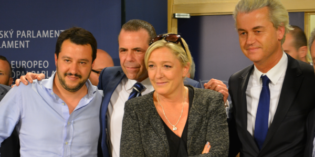Populism

Book Review | Other People’s Politics: Populism to Corbynism by J.A. Smith
In Other People’s Politics: Populism to Corbynism, J.A. Smith seeks to critically analyse and historicise our contemporary political moment, tracing the conditions that made movements like Corbynism possible, while also diagnosing their shortcomings and mapping out potential strategies for a new Left Populism. This is a welcome critical intervention into debates on populism and should be read by scholars across the social sciences and humanities, recommends Paul Ewart.

Book Review | The New Populism: Democracy Stares into the Abyss by Marco Revelli
In The New Populism: Democracy Stares into the Abyss, Marco Revelli explores the definitions, historical development and electoral geography of populism across much of Europe and the United States, focusing particularly on the relationship between populist politics and neoliberalism. While the book provides a wealth of detail on the ideology and history of populism and is particularly strong in examining Italy and its various populist vehicles, its reiteration of familiar themes in the literature risks the book falling behind the cutting edge of populism studies, writes Ben Margulies.

Most populist radical right parties across Europe are not eager to leave the EU
After the 2016 Brexit referendum, there was speculation that other Eurosceptic parties across the EU would try to capitalise on the result and advocate their own countries’ exit. However, Stijn van Kessel finds that any initial enthusiasm among populist radical right parties for EU-exit quickly faded, and most have been muted or equivocal in their Euroscepticism, concentrating instead on more immediate concerns of voters, who generally do not prioritise the EU.

The case of Fratelli d’Italia: how radical-right populists in Italy and beyond are building global networks
With several parties in Italy competing on the right and far right, Valerio Alfonso Bruno and James F. Downes look at the recent growth in support for Fratelli d’Italia. They argue that this party is building domestic support, along with a network of contacts of likeminded populist radical right actors globally, which demonstrates the increased mainstreaming of populist radical right ideas in liberal democracies.

Book Review | Populism by Benjamin Moffitt
In Populism, Benjamin Moffitt offers a new study that looks to assess the current state of scholarship on populism. Going a significant way to providing the clarity that can be so lacking when it comes to understanding populism, this is an essential textbook that Jake Scott recommends to anyone looking for an entry into the field.

Populist politicians on both sides of the Atlantic are plundering history for persuasive purposes
From Brexiters citing Ancient Greek legend to Donald Trump rewriting the details of the Normandy landings, Philip Seargeant writes that contemporary politicians are constantly co-opting history for their own ends. Though they pay lip service to the idea of learning from the past, he argues that these populist leaders have little real interest in engaging with the complexities of the challenges their societies face.

How populist radical right parties have eroded the EU’s human rights agenda in the Mediterranean
It is often assumed that populist radical right parties will support disengaging from the European Union by default. Adrià Rivera Escartin writes that although many of these parties do support disengaging from the EU, there is the potential for a different approach to be adopted in future which might be termed ‘informal and illiberal Europeanisation’. Italy’s capacity to shape EU relations with Tunisia and Hungary’s efforts to influence the EU’s relations with Egypt offer two recent examples of how this trend might materialise.

Book Review | The Far Right Today by Cas Mudde
In The Far Right Today, Cas Mudde provides readers with a comprehensive overview of contemporary far right politics: a pressing task considering that groups or parties once located on the fringe of mainstream politics have experienced a surge in popularity over recent years across Europe and beyond. The most worrying aspect of this surge, argues the author, is the mainstreaming and normalisation of the far right. This is an excellent, accessible and timely book that effectively challenges conventional thinking on the topic, writes Katherine Williams.

Is the resurgence of Europe’s far-right a cultural or an economic phenomenon?
There has been a spectacular rise in support for far-right parties in Europe over the last two decades, but what has driven this electoral success? Drawing on new research, Vasiliki Georgiadou, Lamprini Rori and Costas Roumanias demonstrate that different types of far-right party have benefitted from different factors: economic insecurity has helped increase support for ‘extremist right’ parties, while cultural factors have been associated with the growth of the ‘populist radical right’.



 Democratic Audit's core funding is provided by the Joseph Rowntree Charitable Trust. Additional funding is provided by the London School of Economics.
Democratic Audit's core funding is provided by the Joseph Rowntree Charitable Trust. Additional funding is provided by the London School of Economics.